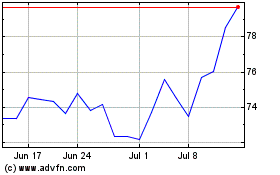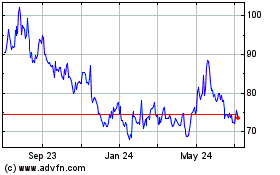Hong Kong Listing Boosts Alibaba Stock
November 28 2019 - 7:35AM
Dow Jones News
By Joanne Chiu and Stu Woo
HONG KONG -- Alibaba Group Holding Ltd.'s Hong Kong listing has
given a fresh boost to what was already China's most valuable
technology company.
The e-commerce giant's stock jumped 5.6% to 204 Hong Kong
dollars ($26.07) Thursday, giving investors who subscribed to the
$11.2 billion secondary offering a nearly 16% gain in three days
since the shares began trading on Tuesday morning.
Alibaba leaders said they wanted to list in Hong Kong because,
compared with its primary listing in New York, the semiautonomous
Chinese city has more investors who regularly use its products.
Alibaba dominates Chinese online retail and is pushing into food
delivery, cloud computing and other businesses.
"The U.S. investors probably gave it a discount it doesn't
deserve," said Bernstein analyst David Dai. He said the high share
price will help Alibaba motivate employees with stock options,
raise money in the future and boost the company's international
prestige.
Alibaba's American depositary receipts rose 5.4% over the past
three sessions to US$200.82. That is just a tad off its historic
high in June last year, and gives the company a market value of
more than half a trillion dollars.
The difference between the two share-price moves in the last
three trading days is because the Hong Kong stock was initially
cheaper, since it was priced last week at a discount to the U.S.
securities. After Thursday's action, it is now trading at a
significant premium.
Some Chinese funds in Hong Kong have bought Alibaba stock, and
in coming months investors based in mainland China may rush to do
the same once the company's shares are available via a stock
connect program. If so, Alibaba's stock may rise further, said
David Gaud, Asia chief investment officer and head of discretionary
portfolio management at Pictet Wealth Management.
"Mainland investors are more comfortable with high valuations,"
he said.
At Wednesday's U.S. close, Alibaba was trading at a price of 24
times estimated earnings for the next 12 months, lower than its
rival Tencent Holding Ltd.'s nearly 27 times for the same period,
according to FactSet.
Alibaba leaders wanted its 2014 initial public offering to be in
the Asian financial hub, but at the time the Hong Kong exchange's
"one shareholder, one vote" principle clashed with the company's
complicated structure that gives founders more control over other
shareholders. Alibaba settled for New York, where it raised $25
billion, a record that may be eclipsed in coming weeks by oil giant
Saudi Aramco's IPO. Hong Kong's exchange since relaxed its rules,
paving the way for Tuesday's listing.
The exchange is now reaping extra business. Alibaba shares
valued at HK$8.37 billion traded hands on Thursday, making it the
city's most active stock and accounting for more than a 10th of
total market turnover by value.
On Wednesday, the city's index compiler said Alibaba will join
the Hang Seng Composite Index from Dec. 9. The company isn't yet
eligible for the city's benchmark Hang Seng Index, but the index
compiler will consult investors on whether to include companies
with dual-class shares to its major benchmark in the first quarter
of next year.
Alibaba hasn't laid out detailed plans on how it intends to use
the $11.2 billion it raised. The company already had nearly $33
billion in cash and equivalents as of Sept. 30. Alibaba leaders
have said they simply wanted more flexibility, for example, to
invest in expanding businesses or for potential acquisitions. The
total raised may rise to about $13 billion if bankers underwriting
the deal exercise an option by mid-December to buy more shares.
Write to Joanne Chiu at joanne.chiu@wsj.com and Stu Woo at
Stu.Woo@wsj.com
(END) Dow Jones Newswires
November 28, 2019 07:20 ET (12:20 GMT)
Copyright (c) 2019 Dow Jones & Company, Inc.
Alibaba (NYSE:BABA)
Historical Stock Chart
From Mar 2024 to Apr 2024

Alibaba (NYSE:BABA)
Historical Stock Chart
From Apr 2023 to Apr 2024
